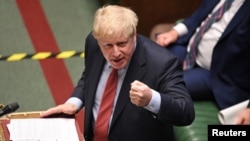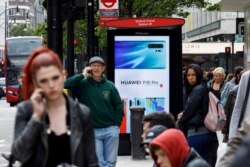There is growing speculation that Britain may be about to reverse course and ban Chinese firm Huawei from Britain’s rollout of 5G mobile telecoms technology.
Prime Minister Boris Johnson approved Huawei’s involvement in the construction of non-core elements of Britain’s 5G mobile network in January. The United States strongly criticized that decision, warning that the company is closely linked to the Chinese government and poses a big security risk. It appears Johnson may be about to heed that warning.
“I am very, very determined to get broadband into every part of this country, reaching out for across the whole of the U.K. And we're convinced that we can do that,” Johnson told reporters Monday. “I am also determined that the U.K. should not be in any way be vulnerable to high-risk state vendors. So, we'll have to think carefully about how we handle that. We'll have to come up with the right technological solutions.”
So, what has changed?
In May, the United States imposed sanctions preventing U.S. companies from supplying Huawei with crucial microchips used in 5G technology. Britain’s National Cyber Security Center, part of the intelligence services, has since warned that the U.S. move makes Huawei technology less secure and reliable.
British lawmakers opposed to Chinese involvement say the government should use the opportunity to change course. Among them is former Conservative Party leader Iain Duncan Smith, who has set up a group called the Inter-Parliamentary Alliance on China, which aims to facilitate dialogue among Western allies over the perceived threat posed by Beijing.
“It became very apparent to them [the British government] that they had got this wrong, I think, over the last few months, and that they even knew they had to change,” Duncan Smith told VOA in a Skype interview Tuesday. “So, what’s helpful in a way is America banning on the chips, because that will certainly hamstring Huawei and make them far less viable.”
“What’s happened since, of course, since COVID and China’s failure to get that under control early or to inform anybody about the nature of it and its spread — that’s also persuaded people that these are not trustworthy as a government,” Duncan Smith said. COVID-19 is the disease caused by the novel coronavirus.
The chairman of Huawei U.K., John Browne, says the United States is simply trying to crush a commercial rival.
“The rhetoric certainly is, ‘The friend of my enemy is my enemy.' And so this is not an ideal position to be in. There's no diplomacy here, which says on the one hand, we can disagree on some things; on the other hand, we can agree on others. The U.K. has had a very long relationship with China and I hope it's not one that they simply throw away,” Browne told the Reuters news agency Tuesday.
The Huawei decision comes at a crucial time for Britain. Johnson is trying to build what he calls a new "global Britain" following the country’s official exit from the European Union in January and is eyeing new trade deals with the United States and China. London finds itself torn between those two rival powers.
In 2015, then-Prime Minister David Cameron hailed a new "golden era" in Sino-British relations as he welcomed President Xi Jinping to London with a full state visit and banquet at Buckingham Palace.
Just five years on, tensions are rising fast over Huawei, China’s imposition of a new security law on Hong Kong, and Beijing’s handling of the coronavirus pandemic. China’s ambassador to Britain, Liu Ziaoming, gave a stark warning in an internet broadcast Monday. “We want to be your friend; we want to be your partner, but if you want to make China a hostile country, you have to bear the consequences,” Liu said.
A final decision on Huawei is expected before the British Parliament breaks for its summer recess July 22.







